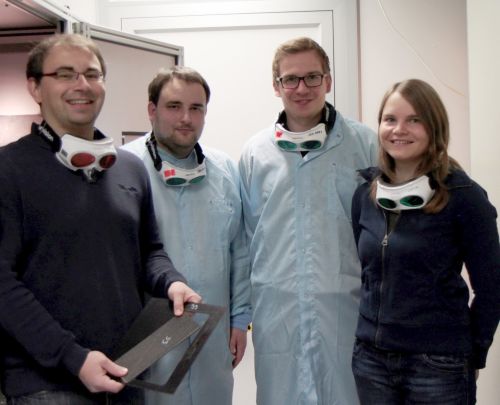Stuttgart laser researchers create worldwide unique combination

The IFSW team from laser and process development: (from left to right) Christian Freitag, Jan-Philipp Negel, André Loescher, Margit Wiedenmann.
In 2013 the Federal President for Technology and Innovation honoured the further development of ultra-short laser pulses (UKP lasers) from a research tool into a successful tool in series production with the German Future Prize.
A team of researchers at the Institute for Beam Tools (IFSW) at the University of Stuttgart has now succeeded in taking a further quantum leap in this field of technology that has become so important for highly precise material processing: for the first time the scientists processed carbon fibre-reinforced plastics (CFRP) with a laser of pulse length eight picoseconds with a mean power of up to 1.4 kilowatt and pulse energies of up to 4.5 millijoules (mJ).
This combination was able to be achieved for the first time worldwide. The high pulse energies are more favourable than a high pulse frequency for many applications and especially for processing CFRP.
The innovative laser source was developed at the IFSW in the framework of a cooperation project with Trumpf Laser GmbH funded by the Federal Ministry for Education and Research (BMBF). This source enables increasing the mean power through strengthening the pulse energy by means of an IFSW disk laser module and an ingenious arrangement of mirrors in a so-called multipass amplifier.
“Even the beam source itself set a new world record. Due to the unique combination of ultra-short pulses of high energy and a mean power in the kilowatt range, it enables highly precise processing with productivity never seen before“, according to the head of the IFSW and vice rector for knowledge and technology transfer at the University of Stuttgart, Prof. Thomas Graf.
In initial experiments this laser source was now used to process various materials. Separating and drilling carbon-reinforced plastics, where an increase in performance is particularly important for industrial applications in the construction of aircraft and automobiles was thereby the main issue.
Research has long been performed at the IFSW with the support of the Baden-Württemberg Foundation on the underlying influencing variables with the laser processing of CFRP as well as with BMBF support in the implementation in industrial applications. That is why very good results could be achieved even in the initial experiments.
Therefore this success is also of great importance for the IFSW since it shows how productive a close cooperation between laser and process development is. Details on the laser source and the results described here as well as the latest experiments will also be presented at the Stuttgart Laser Days SLT’14 on 24th and 25th June 2014 at the Stuttgart Trade Fair, www.slt.uni-stuttgart.de .
Further information:
Dr. Rudolf Weber, Dr. Marwan Abdou Ahmed, University of Stuttgart, Institute for Beam Tools,
Tel. 0711/685-66844, -69755, Email: weber (at) ifsw.uni-stuttgart.de, abdou-ahmed (at) ifsw.uni-stuttgart.de
Andrea Mayer-Grenu, University of Stuttgart, Department of University Communication, Tel. 0711/685-82176,
Email: andrea.mayer-grenu (at) hkom.uni-stuttgart.de
Media Contact
All latest news from the category: Materials Sciences
Materials management deals with the research, development, manufacturing and processing of raw and industrial materials. Key aspects here are biological and medical issues, which play an increasingly important role in this field.
innovations-report offers in-depth articles related to the development and application of materials and the structure and properties of new materials.
Newest articles

High-energy-density aqueous battery based on halogen multi-electron transfer
Traditional non-aqueous lithium-ion batteries have a high energy density, but their safety is compromised due to the flammable organic electrolytes they utilize. Aqueous batteries use water as the solvent for…

First-ever combined heart pump and pig kidney transplant
…gives new hope to patient with terminal illness. Surgeons at NYU Langone Health performed the first-ever combined mechanical heart pump and gene-edited pig kidney transplant surgery in a 54-year-old woman…

Biophysics: Testing how well biomarkers work
LMU researchers have developed a method to determine how reliably target proteins can be labeled using super-resolution fluorescence microscopy. Modern microscopy techniques make it possible to examine the inner workings…





















